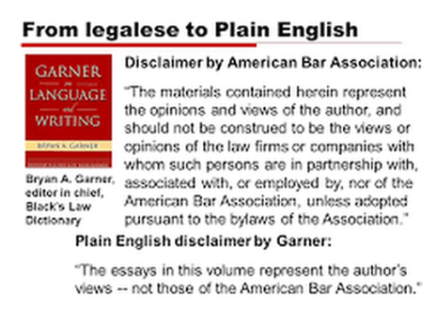Strategies for avoiding tedious repetition of the same words – III (Third of a 3-part series)This is the third of a 3-part series on how to get rid of the repetitive and abstruse stock phrases that seep into our own English after repeated exposure to bureaucratese, legalese, and academese—phrases that soon make us sound like petty bureaucrats, lawyers, and academicians ourselves. In the second part of this series, I said that writers and speakers in English would be ill-advised to alternate the preposition “about” with the phrases “with regard to,” “with reference to,” or “as regards” in subsequent parts of the same exposition. These phrases certainly can eradicate repetition in your prose, but they will definitely make your language standoffish and thus just get in the way of clear communication.
Along with “about,” these phrases belong to the class of words known as function words. As mentioned in the second part of this series,
the function words are the logical operators of the language; as such, they have very specific purposes and roles to play in the creation of meaning. In the particular case of prepositions, there’s a unique word for combining a word or phrase with another noun phrase to express a modification or predication; as a rule, for instance, the prepositions “on,” “in,” “at,” “to,” “toward,” and “after” can’t be substituted with or interchanged with one another.
Although most preposition usage is essentially conventional rather than logical, specific prepositions have become so well-established for evoking particular relationships in space, time, and logic that it would be foolhardy to misuse them or to trifle or tinker with them. To pave the way for good communication, the writer is thus expected to have a healthy respect for conventional preposition usage.
Now, the preposition “about” belongs to the normal, day-to-language register of English. A
language register is, by the way, simply a variety of a language that’s used in a particular social, occupational, or professional context. In general, the language of register of English can be classified into six categories in terms of degree of formality:
very formal, which is characterized by very rigid, bureaucratic language;
formal, characterized by ceremonious, carefully precise language;
neutral, characterized by objective, indifferent, uncaring language;
informal, characterized by casual or familiar language;
very informal, characterized by very casual and familiar language; and i
ntimate, characterized by personal and private language.
It so happens that in the legal profession, a variety of English has developed that’s pejoratively called legalese.
Legalese is a stern, officious language that can be roughly classified between very formal and formal. This is the language that lawyers use in making contracts, affidavits, depositions, and pleadings before a court of law. A common feature of legalese is the substitution of the day-to-day, vanilla-type preposition “about” with the ponderous phrases “with regard to,” “with reference to,” and “as regards,” and the substitution of the day-to-day, vanilla-type conjunctions “because,” “so,” and “later” with the longish words “whereas,” “therefore,” and “hereinafter,” respectively.


When legalese stays within legal circles, all’s well with English as we laypeople know it. Unfortunately, legalese has been continually leaching into both written and spoken English over the years, such that a typical memo or business report these days sounds very much like a legal brief meant for lawyers and court magistrates. So, when peppered with legalese such as “attached herewith,” “aforesaid,” “heretofore,” and “for your perusal,” business English becomes very rigid and bureaucratic and, in tone, extremely formal or harsh.
This is the language register and tonality that your English would acquire if, for the purpose of avoiding repetition of the preposition “about,” you get into the habit of routinely alternating it with such legalese as “with regard to,” “with reference to,” and “as regards.” Even worse, your use of these forms of legalese will force you to make unwieldy, complicated sentence constructions to match their ponderousness and severity.
My general advice to English users then is to fiercely resist the temptation to alternate common prepositions and the function words with their legalistic counterparts. You’ll be much better off as a writer and communicator by using the plain-and-simple English prepositions and conjunctions instead—even repeatedly. You can be sure that your readers or listeners will like your writing much better that way.
This essay, 849th in the series, first appeared in Jose A. Carillo’s weekly “English Plain and Simple” column in the July 13, 2013 issue of The Manila Times
, © 2013 by the Manila Times Publishing Corp. All rights reserved.READ THE FIRST TWO PARTS OF THE SERIES:Strategies for avoiding repetition and abstruse stock phrases - IStrategies for avoiding repetition and abstruse stock phrases - II